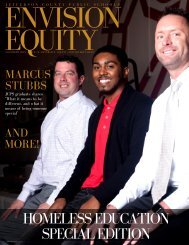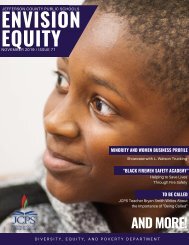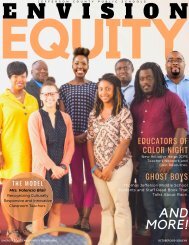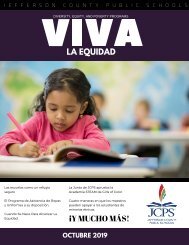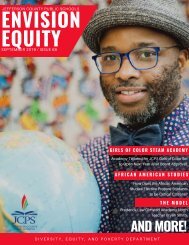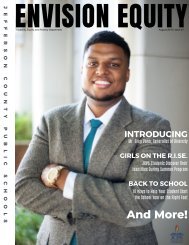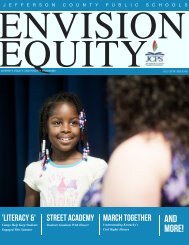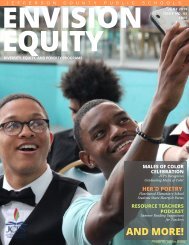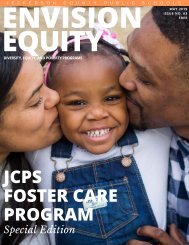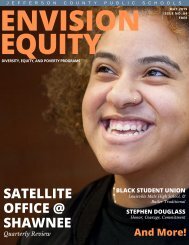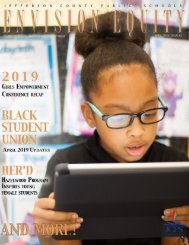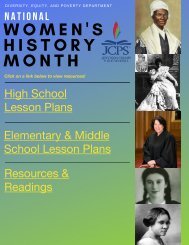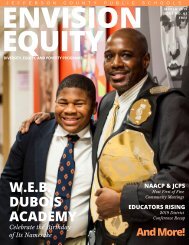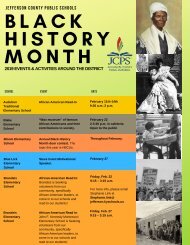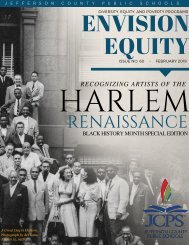November 2018 Envision Equity
You also want an ePaper? Increase the reach of your titles
YUMPU automatically turns print PDFs into web optimized ePapers that Google loves.
J E F F E R S O N C O U N T Y P U B L I C S C H O O L S<br />
DIVERSITY, EQUITY, AND POVERTY DEPARTMENT<br />
NOVEMBER <strong>2018</strong> | ISSUE 55<br />
RESOURCE<br />
TEACHER<br />
SPOTLIGHT<br />
Lamanda Moore-Rodriguez<br />
& Matt Ammerman<br />
COLLEGE ACCESS<br />
for Students in Foster Care<br />
THE MODEL<br />
Recognizing Culturally<br />
Responsive and<br />
Innovative Classroom<br />
Teachers<br />
And More!<br />
COMMUNITY<br />
ANNOUNCEMENTS<br />
1
College Access<br />
for students in<br />
foster care<br />
By Lindsay Bale<br />
JCPS Foster Care Coordinator<br />
It’s FAFSA time!! According to national data<br />
from the Legal Center for Foster Care and<br />
Education, between 70% and 84% of foster<br />
youth want to go to college, but only<br />
31%-45% enroll in college (April, <strong>2018</strong>). Of the 11.6<br />
million jobs created since the Great Recession,<br />
11.5 million have gone to workers with at least<br />
some college education. The weekly income of<br />
someone with a bachelor’s degree is more than<br />
double that of someone with less than a high<br />
school diploma, with these income trends holding<br />
true over the course of one’s lifetime.<br />
One of the ways we can help students continue on<br />
to post-secondary education is by making it<br />
affordable for them! Did you know that students<br />
in foster care or who were in foster care any time<br />
after the age of 13 can file an independent status<br />
on the FAFSA? This means they do not have to<br />
include parental income in their application, in<br />
many cases allowing them to qualify for the<br />
maximum financial aid award.<br />
The FAFSA application window opened October<br />
1 st . Awards are made on a first come, first serve<br />
basis so it is best to complete the FAFSA as soon as<br />
Continue on next page<br />
2<br />
Photo, google images
possible. If you know a student in<br />
foster care who will graduate in<br />
2019, help him/her complete the<br />
FAFSA!<br />
Be sure to talk to students about<br />
the importance of grants versus<br />
loans. Students may not need to<br />
take out any loans if they are<br />
eligible for the college tuition<br />
waiver, tuition assistance, or<br />
educational training voucher.<br />
In Kentucky, students who age<br />
out of foster care or are adopted<br />
from foster care (and meet<br />
certain requirements) are<br />
eligible for additional support<br />
Photo, Abdul Sharif<br />
provided by the tuition waiver, which allows them to attend any public university in Kentucky and have their<br />
tuition waived. Students who are in foster care and remain committed to the child welfare agency beyond<br />
their 18 th birthday qualify for tuition assistance. Find detailed information here: http://<br />
manuals.sp.chfs.ky.gov/chapter4/12/Pages/4284HigherEducationAssistance.aspx. In addition to the<br />
tuition waiver and tuition assistance, students who were adopted after the age of 16 or students who exit<br />
foster care after their 18 th birthday may be eligible for Educational and Training Voucher funds to help with<br />
the cost of a job training program or post-secondary education costs not covered by the tuition waiver. Find<br />
detailed information here: http://manuals.sp.chfs.ky.gov/chapter4/12/Pages/<br />
4285EducationalTrainingVoucherforAgedOutYouth.aspx.<br />
While students in foster care want to attend college, many of them do not enroll because of financial<br />
concerns, needing to work, and lack of housing. The supports afforded by the state and federal governments<br />
could help alleviate some of these barriers. Be a champion for a youth in foster care! If a student in foster<br />
care or who has been in foster care is in need of assistance with FAFSA completion, contact your Regional<br />
Independent Living Coordinator, Jeff Culver, at 595-4504 ext. 5704 or one of your KHEAA Outreach<br />
Counselors, Candice Johnson 541-7445 and Steven Held 352-5697. Visit fafsalouisville.org for more<br />
information. As always, contact your JCPS Foster Care Liaison for any educational needs you have for<br />
students in foster care. You can reach Lindsay at 485-6358 or Lindsay.bale@jefferson.kyschools.us
The Model<br />
Recognizing Culturally Responsive and Innovative Classroom Teachers<br />
Name: Cynthia Fields<br />
School: Newburg Middle School<br />
My name is Cynthia Fields. This is<br />
my 8th year of teaching, and my<br />
fourth year at Newburg Middle School.<br />
This year I am teaching 6th grade<br />
Language Arts. I have a Bachelor’s of Arts<br />
Degree in English and a Master’s of Arts in<br />
Teaching. I was a recipient of the Hilliards<br />
Lyons 2015 Excellence Award. My passion is<br />
establishing a positive classroom<br />
environment with procedures, daily<br />
routines and engaging lessons. Each<br />
month at Newburg, I develop and facilitate<br />
the Effective Classroom Management<br />
Professional Development.<br />
I recently retired from the United States<br />
Postal Service, where I worked for 33 years.<br />
I believe that creating a positive classroom<br />
is paramount if students are going to have<br />
an equitable and safe learning<br />
environment. In order to do this, first you<br />
Continue on next page<br />
4<br />
Photo by Abdul Sharif
must have high expectations for students. Teachers must acquire a mindset that all<br />
students can learn. I truly believe that my students are distinguished scholars of<br />
integrity and honor. I speak this to them every day. I explain that distinguished<br />
means you are set apart from everyone else. You are special. Scholar means that<br />
you are smart,<br />
and smart doesn't<br />
mean you get all<br />
“As.” It means<br />
that you must<br />
give your best<br />
effort every day.<br />
Integrity means<br />
you are honest<br />
and trustworthy.<br />
You will do the<br />
right thing when<br />
no one is<br />
watching. Once<br />
they know who<br />
they are… their behavior, posture, and conversation changes.<br />
My classroom is a community where scholars are willing to support and help each<br />
other. We celebrate each other successes and failures. Yes, we celebrate failures. My<br />
students know the positive mindset of failing means that we have the opportunity to<br />
learn from our mistakes. Therefore, every scholar speaks with confidence because<br />
they know their classmates will celebrate them by shouting out “We celebrate you!”<br />
and “You are learning!” The whole class celebrates by clapping. They even celebrate<br />
me when I make mistakes and I smile and say “thank you.” It is an amazing positive<br />
learning environment.<br />
How do I make this happen? There are many reward systems in place. First, there is a<br />
tiger (school’s mascot) dollar that students can earn. When a student is observed<br />
doing an act of kindness, I may or may not give them a tiger dollar. My scholars know<br />
Continue on next page<br />
5
that showing kindness is what we should do. Every so often, I may show my<br />
appreciation by giving them a tiger dollar. Students can redeem this tiger dollar<br />
from the Integrity Store every Friday. In this store, they can buy erasers, notebooks,<br />
lead pencils, and snacks. Everything in the store is worth one tiger dollar. Another<br />
reward system is the competition<br />
with the teacher’s marble jar and<br />
the student’s marble jar. For<br />
example, if students come into<br />
the room meeting all<br />
expectations, they can get a<br />
handful of marbles in the<br />
student’s jar. However, if they<br />
choose not to meet expectations, I<br />
will get the marbles in my jar. The<br />
jar that fills up first will win. If the<br />
teacher’s jar fills up first, the<br />
student’s jar will be emptied and they will have to start all over. On the other hand,<br />
if the students jar fills up first, they will earn a reward of their choice.<br />
Once I establish a respectful and<br />
safe classroom environment,<br />
students are ready to learn. To<br />
capture and keep their attention,<br />
my lessons must be engaging,<br />
relevant and culturally responsive.<br />
My most recent lesson was on Dia<br />
De Los Muertos (Day of the Dead).<br />
Students annotated the article<br />
“Day of the Dead Sweets and<br />
Treats” from Newsela. After reading<br />
the article, students had a performance test to show if they understood the article.<br />
Continue on next page<br />
6
Scholars had four choices to show their learning: 1. Popplet - a mind mapping<br />
app; 2. Shadow Puppet EDU- a media app for videos; 3. Hands-on activity of<br />
building an<br />
ofrenda (altar)<br />
or 4. making a<br />
mask skull.<br />
Surprisingly,<br />
every student<br />
chose the<br />
hands-on<br />
activities. After<br />
completing<br />
the projects,<br />
students must<br />
defend their<br />
project by<br />
explaining the<br />
historical<br />
tradition from the article and how it relates to their project. Students will defend<br />
their answer by completing a Google Slide and by giving a presentation before<br />
their classmates. They will take this Google Slide and upload it in Shadow<br />
Puppet, a media for creating videos through pictures. This will be uploaded to<br />
their Backpack to show their skills of communicating, creating and using higher<br />
level thinking.<br />
Click here for video story.<br />
7
ENVISION EQUITY NOVEMBER <strong>2018</strong><br />
<strong>2018</strong> JCPS Hip-Hop<br />
Summit Recap<br />
By Abdul Sharif, Generalist—Diversity, <strong>Equity</strong>, and<br />
Poverty Programs Department<br />
Photo, Abdul Sharif<br />
On October 18, DEP hosted the second annual Hip-Hop Summit at the Academy @<br />
Shawnee. The Hip-Hop Summit helps students use their voices; provides JCPS<br />
educators with the tools to use Hip-Hop, poetry, and movement to build rapport with their<br />
students; and gives students an opportunity to display their talents. During the Hip-Hop Summit,<br />
teachers attended breakout sessions that provided them with methods and strategies to use Hip-<br />
Hop to engage their students. These breakout sessions included such topics as “Black Girls:<br />
Living, Thriving, Resisting, and Being Carefree,” which was facilitated by Dr. Ahmad Washington,<br />
an assistant professor at the University of Louisville, and Cassandra Webb, a planning and<br />
8<br />
Continue on next page
programs associate<br />
at Cities United. In<br />
this session,<br />
participants<br />
examined and<br />
considered how<br />
Black girls and Black<br />
women successfully<br />
negotiate and resist<br />
institutionalized<br />
sexism and misogyny<br />
in academic settings<br />
through a number of<br />
ingenious rhetorical<br />
and kinesthetic<br />
practices (e.g.,<br />
ratchedness, Black Girl Magic). Additionally, Dr. Damien Sweeney, a JCPS counselor,<br />
facilitated a breakout session titled “The Warm-Up: A #HipHopEd Exemplar.” This session<br />
was intended to<br />
show educators<br />
how to bring Hip-<br />
Hop to the<br />
classroom or to a<br />
group counseling<br />
session. Attendees<br />
participated in this<br />
breakout session<br />
from the lens of a<br />
student in order to<br />
learn unique ways<br />
they can reach<br />
kids through Hip-<br />
Hop.<br />
Above, Dr. Brandon McCormack speaks during the<br />
opening of the Hip-hop Summit.<br />
Above, Dr. Ahmad Washington speaks during the opening<br />
of the Hip-hop Summit.<br />
9
In addition to breakout<br />
sessions, attendees of<br />
the <strong>2018</strong> Hip-Hop<br />
Summit also heard from<br />
keynote speaker Dr.<br />
Brandon McCormack,<br />
enjoyed live music<br />
provided by AMPED and<br />
The ELITEgiance DJ<br />
Mentoring Program,<br />
and received a live<br />
performance from<br />
students in the Saffiyah<br />
Dance Program.<br />
This was our second Annual Hip-Hop Summit, but it will not be our last. According to<br />
JCPS Chief <strong>Equity</strong> Officer John Marshall, DEP hopes to expand the future Hip-Hop<br />
Summits to “address some of the racial disparities and inequities in JCPS and to be<br />
more innovative in what we do.” Dr. Marshall stated that “We are teaching in the same<br />
way we taught in the 1980s, and this must change.” And through innovative professional<br />
developments like the Hip-Hop Summit we believe this change will happen.<br />
10
The Model<br />
Recognizing Culturally Responsive and Innovative Classroom Teachers<br />
Name: Kevin Ashford<br />
School: Crosby Middle School<br />
M<br />
y name is Kevin Ashford. I<br />
was born in Wilson, North<br />
Carolina. My family<br />
moved to Hopkinsville, Kentucky<br />
when he was 8 years old. There I<br />
graduated from Christian County<br />
High School. I earned my bachelors<br />
in Art Education from Kentucky<br />
State University and my Masters in<br />
Education from Spalding<br />
University. I has been working<br />
for JCPS as an art teacher at Crosby<br />
Middle School for 19 years. As an<br />
educator, I have also worked with<br />
the Louisville Urban League and<br />
the Louisville Art Society after<br />
school programs.<br />
Click here for video story.<br />
11<br />
Continue on next page<br />
Photo by Abdul Sharif
DEARTH OF BLACK MALE<br />
TEACHERS DISCUSSED AT<br />
COLLOQUIUM<br />
By Jamal Watson<br />
Executive editor of Diverse: Issues In Higher Education.<br />
Reprinted with permission from Diverse: Issues In Higher Education, www.diverseeducation.com<br />
Written October 25, <strong>2018</strong>.<br />
Colleges and universities should be much more aggressive in recruiting and<br />
preparing Black males to become school teachers.<br />
That was one of the many sentiments expressed on Thursday among scholars and<br />
practitioners who gathered at the International Colloquium on Black Males in Education in<br />
Dublin.<br />
The number of Black males in the U.S. teacher workforce continues to hover at about 2<br />
percent – a dismal number — that former U.S. Secretary of Education Arne Duncan tried to<br />
tackle back in March 2012 when he launched a national initiative aimed at recruiting and<br />
training 80,000 new teachers.<br />
In other countries across the globe, the numbers are equally troubling.<br />
Dr. Chance W. Lewis, the Carol Grotnes Belk Distinguished Professor of Urban Education at<br />
the University of North Carolina-Charlotte said that colleges and universities in the U.S.<br />
could do more to steer Black male athletes at their institutions to consider pursuing<br />
teacher education programs.<br />
Dr. Chance W. Lewis speaking at the International Colloquium on Black Males in<br />
Education.<br />
“This is the opportunity for recruitment,” said Lewis. “All it would take is a conversation<br />
across campus.”<br />
That conversation — between faculty, athletic advisers and coaches — is critical to<br />
increasing the numbers, said Lewis, whose book Black Male Teachers: Diversifying the<br />
United States’ Teacher Workforce that he co-wrote with Dr. Ivory A. Toldson, has been<br />
Continue on next page<br />
12
hailed as a roadmap for preparing<br />
administrators on how best to train Black<br />
male students for a career in education.<br />
Lewis said that he’s witnessed an<br />
increased in the number of education<br />
majors among Black males once an<br />
institution has created a pipeline and has<br />
made this issue a top priority.<br />
“There is tremendous opportunities on<br />
your campus,” Lewis told those at the<br />
colloquium, adding that Black male<br />
graduates of teacher education programs<br />
have a strong track record of gaining<br />
employment post-graduation and can also<br />
coach a sport in addition to teaching in<br />
their subject area.<br />
Now in its seventh year, the colloquium<br />
has become a meeting place for<br />
interdisciplinary scholars and<br />
practitioners from across the world to<br />
commune and discuss critical outcomes<br />
for young Black males and boys.<br />
“This year’s colloquium has been<br />
emotionally and psychologically<br />
transformative,” said Dr. James L. Moore,<br />
III., Vice Provost for Diversity at The Ohio<br />
State University and co-chair of the<br />
colloquium. “This year we attracted the<br />
right stakeholders, thought leaders,<br />
researchers and students to advance the<br />
work around Black males beyond the<br />
continental divide.”<br />
Dr. Lemuel W. Watson, the dean of the<br />
School of Education at Indiana University<br />
and Dr. Gregory J. Vincent, the CEO and<br />
chairman of Sigma Pi Phi are among some<br />
of those prominent stakeholders.<br />
Dr. Jerlando F.L. Jackson, the Vilas<br />
Distinguished Professor of Higher<br />
Education at University of Wisconsin-<br />
Madison and the chair of the colloquium,<br />
said that the decision to examine<br />
Frederick Douglass’s time in Ireland in a<br />
year that the world is celebrating his<br />
200th birthday, is particularly meaningful.<br />
“The <strong>2018</strong> Colloquium has been a<br />
tremendous learning experience that has<br />
drawn important and critical connections<br />
between Ireland and Black America,” said<br />
Jackson. “Participants have gotten to hear<br />
about the origins of the term ‘political<br />
blackness” and the times and<br />
contributions of Frederick Douglass.<br />
He said that the first three years of the<br />
gathering was intentionally smaller and<br />
participation was by invitation only.<br />
Since then, there has been a steady and<br />
growing interest in the colloquium.<br />
“I certainly have appreciated the growth,<br />
the committed returnees and the new<br />
participants each year,” said Jackson. “I’m<br />
delighted that folks saw value in the<br />
Colloquium being in Ireland and how<br />
Frederick Douglass provides us a platform<br />
to clarify the impact that Black males have<br />
had internationally for quite some time.”<br />
Jamal Watson can be reached<br />
at jwatson1@diverseeducation.com. You<br />
can follow him on Twitter<br />
@jamalericwatson<br />
13
Diversity, <strong>Equity</strong>, and Poverty Department<br />
The Model<br />
Recognizing Culturally Responsive and Innovative Classroom Teachers<br />
Name: Jeramiah Elsner<br />
School: The Academy @<br />
Shawnee School<br />
MR. Elsner is a graduate of Purdue<br />
University with a B.S. in Biology. He<br />
also graduated from the University<br />
of Louisville with an M.A.T. in Secondary<br />
Education and a Ed.S. in Educational<br />
Administration. Mr. Elsner’s teaching career<br />
stands more than 15 Years—with 10 years<br />
teaching with the Archdiocese of Louisville, and<br />
the last 5 years at The Academy @ Shawnee<br />
Mr. Elsner’s favorite subject is AP<br />
Environmental Science. He believe PBL projects<br />
are the most influential at students achieving<br />
the mastery of standards. With student choice,<br />
students are motivated and engaged in the<br />
learning environment.<br />
<br />
"My philosophy? Simplicity plus variety."<br />
—Hank Stram<br />
Click here for video story and check out<br />
Mr. Peters’ article on the next page.<br />
14<br />
Photo by Abdul Sharif
Resource<br />
Teacher<br />
Spotlight<br />
Ms. Lamanda Moore-<br />
Rodriguez<br />
ENVISION EQUITY SEPTEMBER <strong>2018</strong><br />
L<br />
aManda Moore Rodriguez is an<br />
<strong>Equity</strong> and Inclusion Resource<br />
Teacher for the Department of<br />
<strong>Equity</strong> and Poverty Programs in JCPS.<br />
She earned her Master of Arts in<br />
Teaching from Bellarmine University<br />
and is currently continuing her<br />
education at Spalding University in the<br />
Instructional Leadership program. Her<br />
background as a former Literacy Coach<br />
and Reading Recovery teacher has<br />
given her the opportunity to present at<br />
both the district and national level.<br />
She has presented at the Reading<br />
Recovery National Conference as well<br />
as the Literacy for All Conference in<br />
Providence, Rhode<br />
Island. LaManda has a passion for<br />
literacy and believes that it, and a<br />
quality education is the key to ending<br />
the cycle of poverty.<br />
15<br />
Photo, LaManda Moore-Rodriguez
Resource<br />
Teacher<br />
Spotlight<br />
Mr. Matt Ammerman<br />
ENVISION EQUITY NOVEMBER <strong>2018</strong><br />
Matt Ammerman is in his seventh year working in education and first as an <strong>Equity</strong> &<br />
Inclusion Resource Teacher with the Diversity, <strong>Equity</strong>, & Poverty Programs. He has<br />
held a variety of roles within the school setting including data manager, College &<br />
Career Readiness coach, middle school ECE<br />
teacher, and most recently as an EBD<br />
resource teacher at the elementary school<br />
level. He received his B.S. in Sport<br />
Administration from the University of<br />
Louisville and his MAT with a focus in Special<br />
Education from the University of the<br />
Cumberlands.<br />
As an educator, Matt strives to ensure<br />
all students have a voice in the<br />
classroom and are treated as valued<br />
members of their school. Matt and his wife<br />
Kara have three kids, oldest son Charlie (pre-<br />
K student at Farmer Elementary) and<br />
one year old twins, Madelyn and William.<br />
16<br />
Photo, LaManda Moore-Rodriguez
Coaching Students with DACA<br />
College Access<br />
DACA and undocumented students can go to<br />
KY colleges and universities.<br />
Per CPE policy KRS 13:0245 Section 8:<br />
• An undocumented student who graduates<br />
from a Kentucky high school can enroll at<br />
Kentucky colleges/universities as in-state<br />
residents for tuition purposes.<br />
Need help navigating the application process?<br />
Contact Assistant Director, Diversity<br />
Recruitment- Aimee Huffstetler<br />
502.852.1295, aimee.huffstetler@louisville.edu<br />
Scholarships<br />
These scholarships and resources are<br />
open to DACA, and in some other cases,<br />
undocumented students:<br />
» Migrant Network Collection<br />
» Hispanic Scholarship Fund<br />
» SHPE Foundation<br />
» Latino Student Resource Guide (LLEO)<br />
Resources<br />
» United We Dream (UWD)<br />
» Dream Educational Empowerment Program<br />
(DEEP)<br />
» Scholarships A-Z<br />
» My (Un)Documented Life<br />
Programs & Organizations<br />
The Latino Leadership and College Experience<br />
Camp is a local, community based program<br />
that provides college coaching and leadership<br />
development to Latinx and immigrant youth<br />
including undocumented and DACA students.<br />
For more information visit www.thellcec.org<br />
Kentucky Dream Coalition is an immigrant<br />
youth led organization focused on supporting<br />
the undocumented and DACA-mented youth<br />
and students in the state through organizing,<br />
workshops and mentoring.<br />
For more information visit www.facebook.com/<br />
kentuckydream/<br />
FAFSA<br />
Unfortunately, undocumented and DACA-mented students cannot<br />
receive state or federal financial aid.<br />
DACA students can complete the FAFSA for scholarship purposes.<br />
Step 1: Like all applicants, your first step should be to create an FSA<br />
ID for yourself and your family. If parents do not have a SSN do NOT<br />
create an FSA ID with an ITIN (individual tax identification number).<br />
Undocumented parents and students cannot create an FSA ID or use<br />
an ITIN on FAFSA forms at https://fsaid.ed.gov/npas/index.htm<br />
Step 2: There are 6 sections on the FAFSA: Student Demographics<br />
(which includes student eligibility), School Selection, Dependency<br />
Status, Parent Demographics, Financial Information and Sign & Submit.<br />
The two sections that are most confusing for DACA recipients are<br />
the Student Demographic section (particularly, the student eligibility<br />
questions) and Parent Information (if parents are undocumented).<br />
Step 3: Students can enter their income information manually or<br />
through the IRS retrieval tool if they filed taxes.<br />
Step 4: If the parents of a DACA recipient are undocumented, they<br />
must also not misrepresent themselves. When reporting parental<br />
information, do not use an ITIN in place of a Social Security Number.<br />
Parental information should be entered as follows:<br />
» A parent can complete FAFSA using “000-00-0000” for PARENT<br />
I SSN AND “999-99-9999” for PARENT II (Note: if parent holds<br />
ITIN to file taxes, do not use in place of SSN)<br />
» Parents’ income info must entered manually. Do not try to use the<br />
IRS Data Retrieval tool.<br />
» Because parents don’t have a SSN, they cannot create an FSA ID.<br />
Therefore, parents must print, sign, and mail in signature page.<br />
There is a bar code on the signature page that will match your<br />
parent’s signature to your specific application once the signature<br />
page is mailed into the FAFSA office listed on the signature page.<br />
There is no need to print the entire application. Just send in the<br />
signature page.<br />
Step 5: On the signature/submission pages, students can sign with<br />
their FSA ID. The parent must sign and mail in the signature page. For<br />
the 2019-2020 school year, send the parent signature page to:<br />
Federal Student Aid Programs<br />
P.O. Box 7652<br />
London, KY 40472-7652<br />
Step 6: You will be able to check the status of your FAFSA online<br />
via www.fafsa.ed.gov with the same FSA ID and PIN number you<br />
created when you filed the FAFSA. Once the parent signature page is<br />
processed, you will be able to access your Student Aid Report (SAR)<br />
to view your EFC (expected family contribution), which is the number<br />
that demonstrates your need This information is important for needbased<br />
scholarships.<br />
Adapted from BCTC Latinx Outreach “Coaching Students with DACA”<br />
17
Books for Young Readers<br />
ENVISION EQUITY NOVEMBER <strong>2018</strong><br />
A Card for My Father<br />
By Samantha Thornhill<br />
Illustrated by Morgan Clement<br />
Penny Candy Books, <strong>2018</strong><br />
Ages 5-11<br />
Go Show the World: A Celebration of Indigenous Heroes<br />
By Wab Kinew<br />
Illustrated by Joe Morse<br />
Tundra Books, <strong>2018</strong><br />
Ages 5-9<br />
A Card for My Father is the first book in a planned trilogy about<br />
how a father’s incarceration impacts his school-aged daughter,<br />
Flora. Flora has never met her father and her mother does not<br />
like to discuss him. She has so many questions about who he is<br />
that remain unanswered. One thing Flora knows for sure is that<br />
Father’s Day celebrations at school are painful and<br />
uncomfortable. How will Flora manage when her teacher assigns<br />
a project about fathers?<br />
Go Show the World celebrates Native heroes from many different<br />
cultures, including several people who are not popularly<br />
represented in children’s biographies. The stories are brief, no<br />
more than a few sentences, but for each group Kinew reminds us,<br />
“You’re a person who matters. Yes, it’s true. Now go show the<br />
world what a person who matters can do.” Although directed at<br />
the important figures in the book, the lines read two ways. They<br />
are also clearly intended to speak to Indigenous children and to<br />
remind them of their proud history and their people’s<br />
contributions to American (not just U.S.) history.<br />
How to Be a Lion<br />
By Ed Vere<br />
Doubleday Books for Young Readers, <strong>2018</strong><br />
Ages 4-8<br />
<br />
Leonard the lion is not like other lions. He doesn’t like to crunch and chomp. Leonard is<br />
gentle. He likes poetry and walks. When Leonard meets Marianne the duck, they become<br />
fast friends but a pack of fierce lions tells Leonard he must be FIERCE to be a lion. Fierce<br />
lions chomp ducks. They do not write poems with them. Are the fierce lions right? Can<br />
Leonard be gentle and still be a lion?<br />
Images obtained from Google Images..<br />
Book list provided by the LFPL.<br />
18
ENVISION EQUITY NOVEMBER <strong>2018</strong><br />
Community Announcements<br />
Looking For Lilith Theatre Company<br />
continues to offer middle and high schools<br />
subsidies for their updated bullying<br />
prevention program, CHOICES: An<br />
Interactive Play on Cyberbullying and<br />
Suicide. They also have new performances<br />
available addressing issues of equity and<br />
diversity that can be brought to your<br />
students, faculty and staff. These include<br />
We. Are. Here., which puts the country’s<br />
current socio-political environment under<br />
a critical lens, exploring how “hot button”<br />
issues such as immigration, education,<br />
white privilege, gun control, and<br />
institutional racism affect several families<br />
from different backgrounds, centering<br />
around high school students' experiences<br />
in particular. The Theatre Company is also<br />
improving their fan-favorite, What My<br />
Hands Have Touched, which explores the<br />
experiences of a group of women friends<br />
during World War II, to include<br />
experiences of a wider diversity of<br />
women. For more information visit http://<br />
www.lookingforlilith.org. To book a<br />
Looking for Lilith Touring Progam,<br />
contact Trina Fischer at (347) 228-6438 or<br />
trina@lookingforlilith.org.<br />
Pride and Passion: The African-<br />
American Baseball Experience<br />
This nationally traveling exhibition<br />
examines the challenges faced by African-<br />
American baseball players as they sought<br />
equal opportunities in their sport<br />
beginning in the post-Civil War era,<br />
through integration of the major leagues in<br />
the mid-20th century. The exhibit was<br />
organized by the National Baseball Hall of<br />
Fame and Museum and the American<br />
Library Association, with funding from<br />
the National Endowment for the<br />
Humanities: great ideas brought to life.<br />
View a PDF of this traveling exhibit here.<br />
Daughters of Greatness: Doris Kearns<br />
Goodwin<br />
Throughout the year, the Daughters of<br />
Greatness breakfast series invites<br />
prominent women engaged in social<br />
philanthropy, activism, and pursuits of<br />
justice to share their stories with the<br />
Louisville community. The Daughters of<br />
Greatness series provides a place for<br />
dialogue and discussion on current issues<br />
of justice, community engagement, and<br />
social movements within the Louisville<br />
area and beyond.<br />
December 7, <strong>2018</strong>. 8:30 am - 10:00 am..<br />
Muhammad Ali Center<br />
Have Fun and Get Fit with LUL<br />
The Louisville Urban League is offering<br />
weekly fitness opportunities. Come join<br />
our staff for quick workout or mindfulness<br />
activity. FREE to the public. Please RSVP<br />
here if you can.<br />
19
20
JEFFERSON COUNTY PUBLIC SCHOOLS<br />
<strong>2018</strong><br />
Giveaway!<br />
Saturday, December 8, <strong>2018</strong><br />
10 a.m. to 2 p.m.<br />
TM<br />
Clothing Assistance Program (CAP)<br />
319 S. 15th Street<br />
Louisville, KY 40203<br />
The 15th District Parent Teacher Association (PTA), in<br />
conjunction with Jefferson County Public Schools (JCPS), invites<br />
community residents—especially those residing in the Louisville Metro Government<br />
Zones of Hope Neighborhoods: California, Newburg, Parkland, Russell, and<br />
Shawnee—to the Take What You Can Tote! Clothing Giveaway.<br />
This event will provide each household representative with empty bags. Tables and<br />
racks of gently used clothing and accessories for men and women will be available<br />
on a first-come, first-served basis.<br />
This event will also include books and other special items that will be distributed on<br />
a first-come, first-served basis. Once all items are depleted,<br />
no more will be available.<br />
No uniform or children’s clothing will be included in this giveaway.<br />
If inclement weather cancels this event, it will be moved to Saturday, December 15.<br />
For more information, call CAP at 485-7062.<br />
every child. one voice. ®<br />
Diversity, <strong>Equity</strong>, and Poverty Division<br />
21
W.E.B. DuBois Academy is excited to share their P.R.I.D.E.<br />
with the Louisville community on <strong>November</strong> 15, <strong>2018</strong> at<br />
8: 30 a.m.<br />
DuBois Days tours allow individuals, businesses, and<br />
organizations to get a firsthand glimpse at how we’re<br />
raising our Young Lions into the kings they are meant to<br />
become through an innovative approach to education.<br />
On DuBois Days, you will:<br />
• Discover why we begin each day with dedicated<br />
P.R.I.D.E. time.<br />
• Tour W.E.B. DuBois Academy, led by student<br />
ambassadors.<br />
• Visit classrooms to see students engaged in rigorous<br />
learning activities.<br />
• Learn more about our curriculum.<br />
• Hear real testimonials from parent ambassadors.<br />
• Learn how you can help create a brighter future for<br />
young men in Louisville through our Lions to Leaders<br />
program with Metro United Way<br />
Organizations interested in booking a tour can email<br />
Telva Hogan at telva.hogan@jefferson.kyschools.us<br />
22
J E F F E R S O N C O U N T Y P U B L I C S C H O O L S<br />
Diversity, <strong>Equity</strong>, and Poverty Programs Department<br />
With NyRee Clayton-Taylor, 2019 Kentucky Elementary School Teacher of the Year<br />
For more information, please contact Telva Hogan at 485-7318 or telva.hogan@jefferson.kyschools.us.<br />
To RSVP for the community conversation online, please visit http://bit.ly/nctspeaker. 23<br />
To register for the PD, please visit pdCentral (JCPS Staff).
J E F F E R S O N C O U N T Y P U B L I C S C H O O L S<br />
R A C I A L<br />
E Q U I T Y<br />
P O L I C Y<br />
24
J E F F E R S O N C O U N T Y P U B L I C S C H O O L S<br />
D I V E R S I T Y , E Q U I T Y , A N D P O V E R T Y P R O G R A M S D E P A R T M E N T<br />
G I R L S TO<br />
GALLOWS<br />
Dr. Cherie Dawson-Edwards, a criminal justice and social<br />
change professor, in partnership with the Jefferson<br />
County Public Schools Diversity, <strong>Equity</strong>, and Poverty<br />
Programs Department, will present a series of pd events,<br />
and a community conversation that focus on the<br />
marginalization, resilience, and brilliance of girls of color.<br />
The scaffolding pd will focus on the school system and<br />
how inequities and the lack of restoration for girls (of<br />
color) perpetuate a lower sense of belonging and<br />
contribute to negative academic outcomes.<br />
PD Dates:<br />
<strong>November</strong> 28, <strong>2018</strong> (PD # 18-1999067) | January 23, 2019 (PD # 18-1999072)<br />
March 27, 2019 (PD # 18-1999073) | April 17, 2019 (PD # 18-1999074)<br />
May 15, 2019 (PD # 18-1999106)<br />
Time: 4:45–6:45 p.m.<br />
Location: C.B. Young Jr. Service Center, 3001 Crittenden Drive, Louisville, KY 40209<br />
Community Conversation:<br />
Date: April 18, 2019 | Time: 6–8 p.m. | Location: C.B. Young Jr. Service Center, 3001<br />
Crittenden Drive, Louisville, KY 40209<br />
For more information, please contact Telva Hogan @ telva.hogan@jefferson.kyschools.us or 233-1808.<br />
25
ENVISION EQUITY NOVEMBER <strong>2018</strong><br />
Title Session Code Date & Time Location Contact<br />
Special Education and<br />
Inclusivity<br />
Book Study: Black<br />
Male(d) By Tyrone<br />
Howard<br />
(Administrators<br />
Only)<br />
<strong>Equity</strong> and Inclusion<br />
Institute (Morning<br />
Session)<br />
18-1996503 <strong>November</strong> 1<br />
4:30 to 5:30 p.m.<br />
18-1998247 <strong>November</strong> 1, 15, and 29<br />
4:00 to 6:00 p.m.<br />
18-1998114 <strong>November</strong> 5, <strong>2018</strong><br />
8:00 to 11:30 a.m.<br />
Olmsted Academy<br />
South<br />
Google Classroom<br />
Kentucky International<br />
Convention Center<br />
Dr. Monica Lakhwani<br />
(502) 485-7269<br />
Charles C. Davis, Jr.<br />
(502) 485-7898<br />
Charles C. Davis, Jr.<br />
(502) 485-7898<br />
<strong>Equity</strong> and Inclusion<br />
Institute (Afternoon<br />
Session)<br />
18-1998118 <strong>November</strong> 5, <strong>2018</strong><br />
1:00 to 4:00 p.m.<br />
Kentucky International<br />
Convention Center<br />
Charles C. Davis, Jr.<br />
(502) 485-7898<br />
Student<br />
Empowerment and<br />
Inclusive Pedagogy<br />
18-1997702 <strong>November</strong> 12, <strong>2018</strong> Farmer Elementary Telva Hogan<br />
(502) 485-7318<br />
Hip Hop Helps and<br />
Heals<br />
18-1997224 <strong>November</strong> 13<br />
4:30 to 6:30 p.m.<br />
Diversity Summit 18-1996515 <strong>November</strong> 14-15<br />
4:00 to 6:00 p.m.<br />
Atherton High<br />
Atherton High<br />
Vanessa Posey<br />
(502) 485-3631<br />
Dr. Monica Lakhwani<br />
(502) 485-7269<br />
A Mile In My Shoes.<br />
Homeless Education<br />
18-1993455 <strong>November</strong> 20<br />
9:00 to 11:00 a.m.<br />
VanHoose Education<br />
Center<br />
Giselles Danger<br />
(502) 485-3650<br />
Culturally Responsive<br />
Classroom<br />
Management:<br />
Disruption That<br />
Leads to Engagement<br />
18-1998626 <strong>November</strong> 28<br />
4:30 to 6:30 p.m.<br />
Meyzeek Middle<br />
<strong>Equity</strong> and Inclusion<br />
Unit<br />
(502) 485-7269<br />
Push In: Pulling<br />
Girls of Color Into<br />
Learning<br />
18-1998620 <strong>November</strong> 28<br />
4:30 to 6:30 p.m.<br />
Meyzeek Middle<br />
<strong>Equity</strong> and Inclusion<br />
Unit<br />
(502) 485-7269<br />
Racial <strong>Equity</strong><br />
Analysis Protocol<br />
(REAP)<br />
18-1998608 <strong>November</strong> 28<br />
4:30 to 6:30 p.m.<br />
Meyzeek Middle<br />
<strong>Equity</strong> and Inclusion<br />
Unit<br />
(502) 485-7269<br />
Reaching and<br />
Teaching Black Boys<br />
Through Literacy<br />
18-1998614 <strong>November</strong> 28<br />
4:30 to 6:30 p.m.<br />
Meyzeek Middle<br />
<strong>Equity</strong> and Inclusion<br />
Unit<br />
(502) 485-7269<br />
Windows and<br />
Mirrors: Who Do<br />
Your Students See<br />
18-1998632 <strong>November</strong> 28<br />
4:30 to 6:30 p.m.<br />
Meyzeek Middle<br />
<strong>Equity</strong> and Inclusion<br />
Unit<br />
(502) 485-7269<br />
To view a complete list of DEP professional development sessions, visit https://www.jefferson.kyschools.us/node/1350<br />
26
ENVISION EQUITY NOVEMBER <strong>2018</strong><br />
Announcing...<br />
"The Model"<br />
Starting in the September edition of<br />
<strong>Envision</strong> <strong>Equity</strong>, we will highlight sample<br />
lesson plans and videos of Jefferson<br />
County Public Schools (JCPS) classroom<br />
teachers who are culturally responsive and<br />
innovative. This new section of <strong>Envision</strong><br />
<strong>Equity</strong> will be called “The Model.”<br />
If you are a JCPS teacher or know of a<br />
JCPS teacher who should be highlighted as<br />
a model of culturally responsive and<br />
innovative classroom practices, please<br />
submit his or her contact information to<br />
abdul.sharif2@jefferson.kyschools.us by<br />
the 15th of each month.<br />
Editor—Catherine Collesano<br />
Editor, Photo Contributor—Abdul Sharif<br />
Credits<br />
Special thanks to all of our community partners and educators who helped make this special edition of<br />
<strong>Envision</strong> <strong>Equity</strong> possible.<br />
<strong>Envision</strong> <strong>Equity</strong> is a publication of the JCPS Department of Diversity, <strong>Equity</strong>, and Poverty Programs. All<br />
submissions should be sent to Catherine Collesano at catherine.collesano@jefferson.kyschools.us or Abdul<br />
Sharif at abdul.sharif2@jefferson.kyschools.us. If you are interested in becoming a subscriber or a<br />
contributor to <strong>Envision</strong> <strong>Equity</strong>, please contact one of the editors at the above email address.<br />
www.jefferson.kyschools.us<br />
Equal Opportunity/Affirmative Action Employer Offering Equal Educational Opportunities<br />
27




